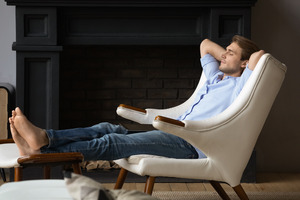
If you have been diagnosed with sleep apnea, you might have already tried a few different strategies for reducing your symptoms, such as losing weight. But there’s one potentially helpful measure that many people don’t often think of: sleeping in a recliner. Here’s why getting some shuteye in a reclining chair instead of your bed could improve the quality of your sleep.
How Can Sleeping in a Recliner Be Beneficial for People with Sleep Apnea?
The main thing to note about sleeping in a recliner is that it keeps your head at an elevated angle. A study performed in 2017 found that patients who slept with their heads at 7.5-degree angles had less severe symptoms. Older studies found that a 30-degree angle or a 60-degree angle (which is what your head is more likely to be at when you’re in a recliner) yielded similar benefits.
The reason why the angle makes a difference is that many cases of sleep apnea are the result of throat tissues collapsing and obstructing your airway. Sleeping in an upright position makes it less likely that the tissues in question will block the flow of air.
What’s the Best Way to Sleep in a Recliner?
When sleeping in a recliner to manage sleep apnea, it’ll be easier to drift off if you follow these steps for getting comfortable:
- Make sure you have proper lumbar support by getting a small pillow for your lower back.
- Use a footrest in order to keep your feet raised.
- Give yourself however many blankets you need to maintain the right sleeping temperature.
- Cover the recliner with a sheet if it’s made out of leather. (Sweat can make leather sticky.)
What If You Can’t Sleep in a Recliner?
While plenty of people are able to get a good night’s rest in a recliner, others would prefer to continue to enjoy the comforts of sleeping on a mattress. If this is how you feel, you can still address your sleep apnea symptoms by making the following changes:
- Get an adjustable mattress that will allow you to lift your head slightly.
- Use an extra pillow to change the angle of your head while you’re asleep.
- Try sleeping on your side instead of on your back.
Of course, before you make any changes to your bedtime habits, you should consult a sleep dentist. Based on the cause and severity of your symptoms, they can help you figure out the best way to get your sleep apnea under control so that you can once again rest soundly during the night.
About the Author
Dr. Jay A. Nelson first started practicing dentistry in 1981. He eventually became interested in dental sleep medicine and has completed more than 500 hours of education on the topic. He provides comfortable oral appliances for sleep apnea patients who can’t tolerate a CPAP machine. If you would like to schedule a consultation with Dr. Nelson at Nelson Dental Sleep Medicine in Wesley Chapel, visit his website or call (813) 733-4169.
